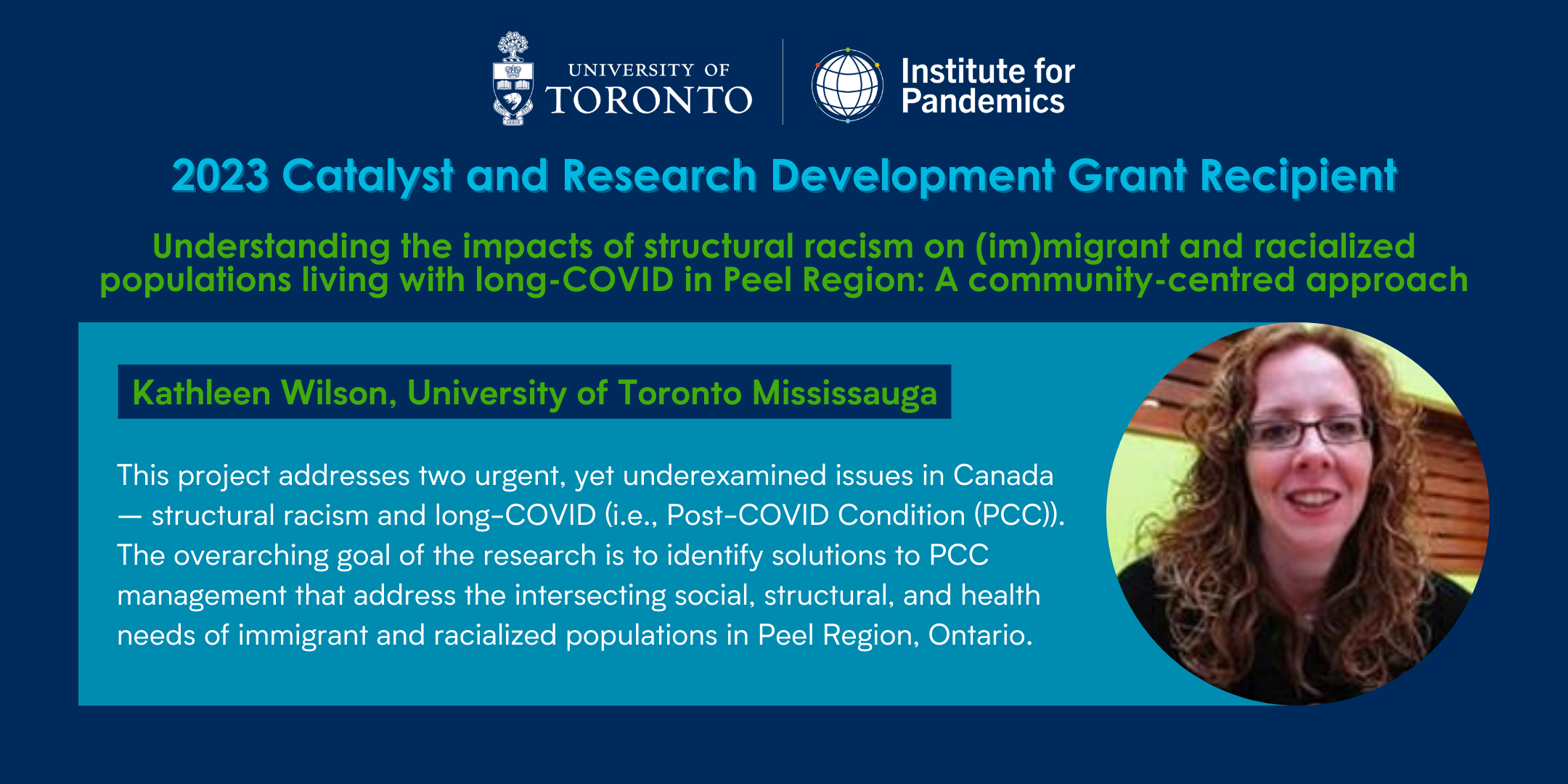
Catalyst and Research Development Grant Project Highlight
Understanding the impacts of structural racism on (im)migrant and racialized populations living with Long-Covid in Pee Region: A community-centred approach
Led by Kathleen Wilson, Tracey Galloway, Mattew Adams, Madeleine Mant, and Ghazal Fazli
Please briefly introduce your catalyst grant project and its objectives/anticipated outcomes.
The work funded by the Institute for Pandemics (IfP) builds on previous research we conducted on the lived experience of the Covid-19 pandemic among immigrant and racialized populations in Peel Region. This previous work involved the building of a team of interdisciplinary researchers at UTM and community partners from Peel Region. As part of this previous research we conducted 79 interviews with residents from Peel Region who identify as immigrants and/or as a racialized person. There were some troubling but not surprising findings related to a lack of access to health care, job loss, a lack of access to vaccines, and confusion related to government decision-making and supports during the pandemic. In addition, participants described concerns with public health messaging (at the provincial and regional level) and a health care system not equipped to provide appropriate support and care for immigrant and racialized populations in Peel Region during the pandemic.
Evidence suggests that immigrant and racialized groups are more likely to suffer higher rates of post Covid condition (also known as PCC and long-Covid) but face disparities in diagnostic testing and treatment due to discriminatory health and social systems rooted in structural racism. Building on this important evidence and what we learned from our previous research project, our IfP-funded research seeks to understand the impacts of structural racism on immigrant and racialized populations living with PCC in Peel Region. Our project objectives include examining how everyday forms of structural racism shape differential experiences of PCC among immigrant and racialized residents, assess how challenges in accessing health services and supports shape (residents’ ability to live with and manage PCC, and how COVID-19 recovery measures and policies at the regional and provincial level align or disconnect with the realities of (immigrants and racialized residents managing PCC in Peel.
Could you tell us more about your partners, and more about their potential impacts while conducting this project?
Given the focus of the proposed research, we have brought together an interdisciplinary research team representing Health Geography, Medical Anthropology, Epidemiology, Sociology, Health Policy, and important community-level collaborators, with each member providing important expertise to this study. At the community level, we have partnered with collaborators from Trillium Health Partners who lead the Family and Child Health Initiative (FCHI). Given the expertise of our FCHI partners in conducting community-based participatory research and the engagement of diverse communities in Peel Region, this partnership is proving to be critical to the success of the project. Our FCHI partners introduced us to the importance of establishing a Community Advisory Board for the research, which we have done. The CAB meets monthly – we had our first meeting in February – and supports study governance, decision-making, research design, and knowledge dissemination. Importantly, following the successful work of our collaborators at FCHI, we have hired 5 Peer Research Assistants who come from the communities we wish to target in this research. We are excited about working with our Peer Research Assistants as they bring lived experiences and knowledge of structural racism/discrimination and long-covid in Peel Region, thereby providing critical firsthand perspectives that will shape the research design, interpretation, and knowledge dissemination and mobilization.
What are the next steps (perhaps both short-term and long-term) for your project?
We have received ethics approval and will begin recruitment for participation in deliberative dialogues to be held across the region. Our CAB meets at the end of this month and during this meeting we will make final decisions about the populations we will target, spaces in the community for holding deliberative dialogues, and the timing of the deliberative dialogues over the summer and early Fall. We are hoping to recruit a total of 100 residents across five deliberative dialogue. A sixth and final deliberative dialogue will be held in the Fall that brings together participants and also includes policy makers and health and social service providers across the region. Following this work, we plan to leverage what we learned from this catalyst grant project to expand the research across the region and other locations and secure funding from CIHR or SSHRC.
For more information about the Catalyst and Research Development Grant Projects, and to read more about this project, click here.
